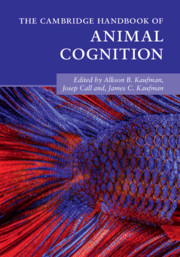Book contents
- The Cambridge Handbook of Animal Cognition
- The Cambridge Handbook of Animal Cognition
- Copyright page
- Dedication
- Contents
- Figures, Tables, and Boxes
- Contributors
- Acknowledgments
- Introduction
- Part I Communication and Language
- Part II Memory and Recall
- Part III Social Cognition
- 11 Social Cognition Overview
- 12 Proximate and Ultimate Mechanisms of Cooperation in Fishes
- 13 Evolutionary and Neural Bases of the Sense of Animacy
- 14 Raven Social Cognition and Behavior
- 15 Reciprocal cooperation – Norway rats (Rattus norvegicus) as an example
- 16 Exploring the Social Minds of Elephants
- 17 Dolphin Social Cognition
- 18 Mirror Self-Recognition
- Part IV Social Learning and Teaching
- Part V Numerical and Quantitative Abilities
- Part VI Innovation and Problem-Solving
- Index
- References
12 - Proximate and Ultimate Mechanisms of Cooperation in Fishes
from Part III - Social Cognition
Published online by Cambridge University Press: 01 July 2021
- The Cambridge Handbook of Animal Cognition
- The Cambridge Handbook of Animal Cognition
- Copyright page
- Dedication
- Contents
- Figures, Tables, and Boxes
- Contributors
- Acknowledgments
- Introduction
- Part I Communication and Language
- Part II Memory and Recall
- Part III Social Cognition
- 11 Social Cognition Overview
- 12 Proximate and Ultimate Mechanisms of Cooperation in Fishes
- 13 Evolutionary and Neural Bases of the Sense of Animacy
- 14 Raven Social Cognition and Behavior
- 15 Reciprocal cooperation – Norway rats (Rattus norvegicus) as an example
- 16 Exploring the Social Minds of Elephants
- 17 Dolphin Social Cognition
- 18 Mirror Self-Recognition
- Part IV Social Learning and Teaching
- Part V Numerical and Quantitative Abilities
- Part VI Innovation and Problem-Solving
- Index
- References
Summary
Cooperative interactions are widespread in the animal kingdom. Their occurrence can be explained by mutually non-exclusive benefits increasing an individual's (1) indirect fitness by cooperating with kin, and (2) direct fitness by mutually or reciprocally cooperating with others. Many cooperative behaviors require well-developed neuroendocrine mechanisms regulating their quantity and quality. Fishes offer great opportunities to increase our insight into ultimate and proximate questions of cooperation. Their social systems range from solitary- and pair-living to lose fission–fusion groups and highly complex societies. Cooperative interactions are an essential part of the behavioural repertoire of most fish species, occurring in a variety of social situations like predator inspection, foraging, mating, or brood care. Such interactions take place among related and unrelated individuals and even between members of different species. This fascinating diversity allows investigating all crucial factors mediating cooperation, e.g., by studying behavioural interactions within and between species, by applying comparative approaches between taxonomic groups and by using state-of-the-art genetic and neuroendocrine technologies to resolve the underlying mechanisms. This chapter provides an overview of the mechanisms and functions of cooperative behaviour in fishes, with the overall aim to illuminate the evolution of cooperative behaviour in general.
- Type
- Chapter
- Information
- The Cambridge Handbook of Animal Cognition , pp. 272 - 294Publisher: Cambridge University PressPrint publication year: 2021
References
- 3
- Cited by

